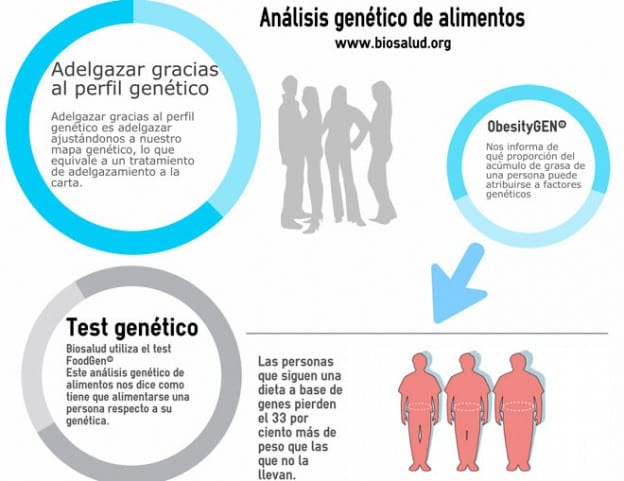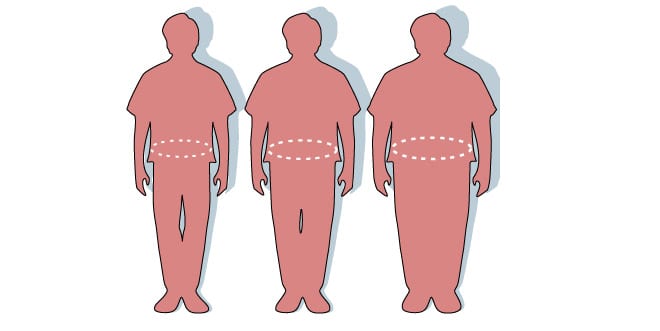
Slimming thanks to genetic profiling
Slimming down through genetic profiling is slimming down by adjusting to our genetic blueprintwhich is equivalent to a treatment of slimming à la carte.
Obesity depends on environmental factors, such as diet or sedentary lifestyle, but also on genes. For example, satiety signals are genetically regulated. There are more than 300 genes involved in obesity.
With a diet according to the needs of the individual's genes, we can treat metabolism-related diseases and other diseases that may be genetically determined for a particular individual.
Genetic nutrition testing
ButHow can we know what to eat according to our genes?
It's simple. Biosalud uses the FoodGen® test
This genetic analysis of food tells us how a person should be nourished in relation to their genetics..
It is also a genetic study that also analyses 20 genes related to the needs for vitamins, minerals, essential fatty acids, including genetic intolerance to gluten and lactose.
Genes determine our nutritional requirements and FoodGen® takes care of personalising them.
The report explains the genetic variants and the Nutrient Table facilitates the design of a personalised diet with the optimal amounts of each.
The result is a diet for your client and no one else, with significant effects on their health and well-being.
If we also want to know how much of a person's fat accumulation can be attributed to genetic factors and what your response to treatment will be, we have the obesity test. ObesityGENwhich allows us to choose the dietary intervention most likely to be successful for the patient.
Slimming down with a personalised diet
Obtaining a personalised diet through the genetic study of an individual is the objective of the Nutrigenomics. And one of the greatest specialists on this subject is Spanish, born in Zaragoza. He is Dr Jose María Ordovas.

He is considered to be one of the founders of the nutrigenomics and has contributed to the training of a large number of researchers. His genetic studies include populations on all continents.
With nutrigenomics, we are moving towards a personalised mode of nutrition that can prevent diseases such as obesity or diabetes.. It is about combining two sciences that have not walked together, nutrition and genomics.
However, more studies and the generalisation of these studies to the whole population are still needed. In the meantime, Dr. Ordovas recommends that we maintaining the nutritional habits of each region. And region is understood in a broad sense. For example, the Mediterranean region. Another piece of advice from this expert is that we should respect the seasonality of food. Moreover, while for some individuals a particular fat, such as that in bacon, may be really harmful, for others it may be less harmful or simply not harmful at all.
Some people are more predisposed to obesity because their DNA expresses it. However, the subject has to project this predisposition with unhealthy habits. And on the other hand, if a person who is genetically predisposed to obesity practises good habits, he or she will prevent obesity from expressing itself..
Gene-based diets. Studies
Recent research carried out by Dr Nicola Pirastu of the University of Trieste, Italy, divided obese individuals into two groups, giving one group a diet according to their genes and the other group not, and showed that "although there were no significant differences in age, sex and BMI (Body Mass Index) between the two groups at the start of the study, the people in the gene-based diet group lost 33 percent more weight than individuals in the other group, and the percentage of lean body mass also increased more in the second group.

Uncovering the genetic basis of taste and food preferences may lead us to increase not only the effectiveness of nutritional interventions, but also compliance with them.
Another study conducted by Dr. Pirastu involved an analysis of DNA samples from 4,000 European and Asian volunteers who discovered 17 genes associated with taste for certain foods.
The range of foods was wide, including bacon, coffee, chicory, dark chocolate, blue cheese, ice cream, liver, butter, orange juice, yoghurt, white wine and mushrooms.
Surprisingly, none of the genes play an active role in taste or smell perception.
We have found a strong correlation between the HLA-DOA gene and the taste for white wine.But we have no idea which of the characteristics of white wine influence this gene," said Dr Pirastu, who presented his findings at the annual meeting of the European Society of Human Genetics (ESHG) in Milan.
These studies on the influence of genes on diet will be important for understanding the interaction between the environment, lifestyles, and the genome in determining health outcomes.

